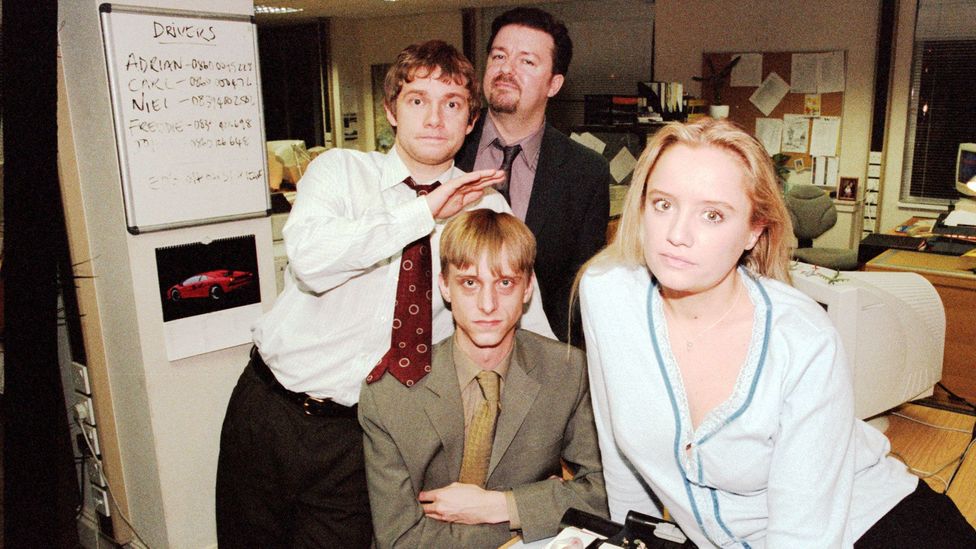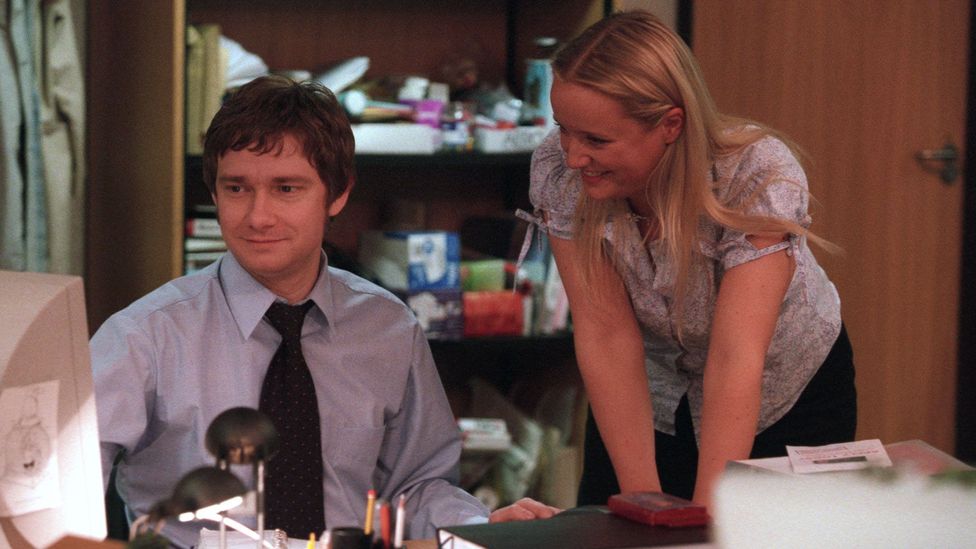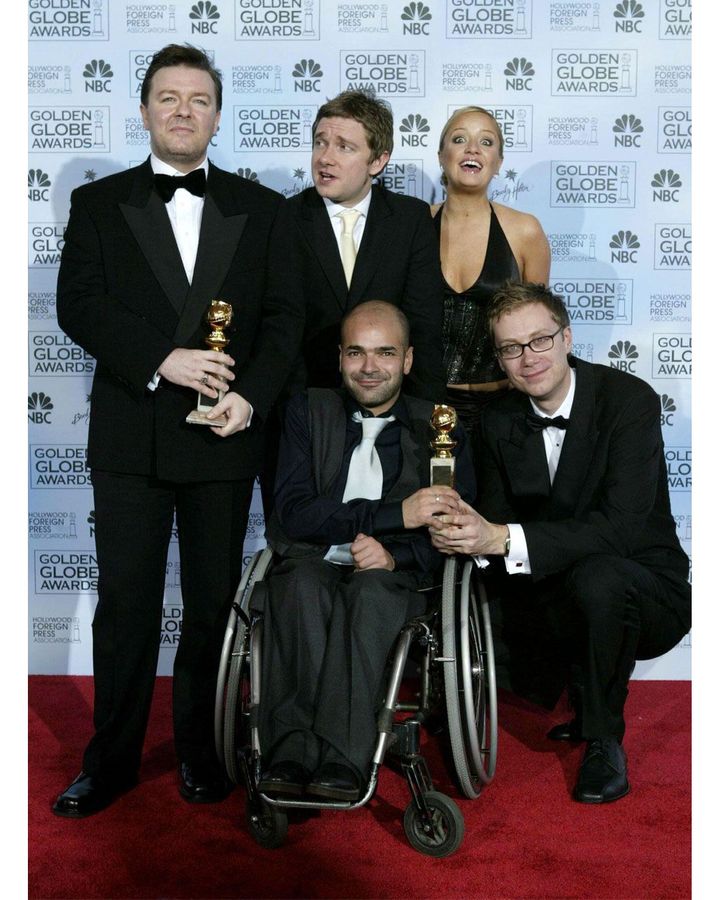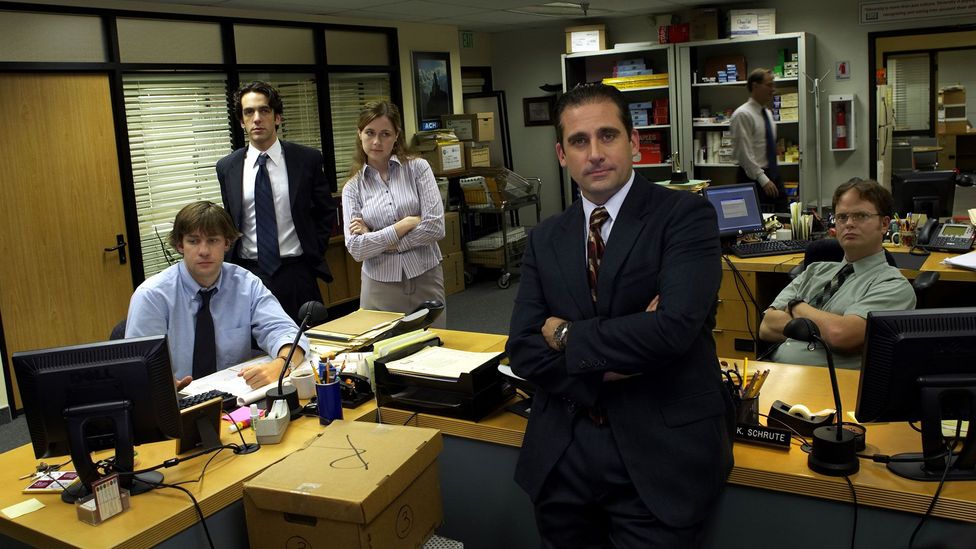a Funny Thing Happened on the Way to the Moon Bbc Documentary Debunked
The Office at 20: The hit TV show that couldn't be made now

Twenty years since the original UK version of The Office first aired, its co-creator Stephen Merchant talks to Clare Thorp about its legacy – and how a show rooted in reality now feels like an escapist fantasy.
S
Shortly after the first episode of The Office aired on British television, on 9 July 2001, its co-creator Stephen Merchant was sitting on a train when he overheard a woman asking her friend if she'd seen "that documentary about that crazy guy in that office?" The friend corrected her, explaining that it wasn't a fly-on-the-wall look at office life but, in fact, a new comedy show. "Oh, well it wasn't very funny then," the woman replied.
Despite the somewhat damning review, Merchant was over the moon. In creating their mockumentary sitcom, set in the world of Slough paper company Wernham Hogg, he and Ricky Gervais had put blood, sweat and tears into making their fictional office as realistic as they could – from the background whirr of the photocopier and the fluorescent lighting to the bored, weary faces staring into their computer screens. "We were obsessed with it feeling real, and our dream was that someone would stumble across it and think it was a real documentary," Merchant tells BBC Culture. "I think we probably leaned into the drudgery and the drabness of it more than we needed to. We got very excited at one point because Martin Freeman [who played Tim] was doing a talking head and in the back of the shot was a dying plant."
More like this:
- Is this TV's most toxic stereotype?
- The shows that reveal the real France
- The art of the plot twist
This was a show intended to look as mundane, as unremarkable, as ordinary as possible. But 20 years since the first episode aired, there is nothing ordinary about The Office. Instead, it is perhaps the most extraordinary comedy success story of the 21st Century. Though it ran for just 14 episodes, its cultural impact is immense. It won Golden Globes, Baftas and a Peabody award, launched hugely successful careers for its cast and creators and influenced scores of comedy shows. It also spawned 10 international versions – including a US series that ran for nine seasons and – despite ending in 2013 – was the most streamed show of 2020 in the US, racking up 57 billion minutes' worth of views. Two decades since that first episode, the show is still finding new fans – even though its premise of a life lived day in, day out in the same office block now feels like it's describing a slightly bygone era.

Since The Office, Merchant (pictured) has gone on to write and direct TV series and films, including the 2019 comedy drama Fighting with my Family (Credit: Alamy)
Merchant and Gervais met working at London radio station XFM. When Merchant later started a trainee producer course at the BBC, the pair collaborated on a short comedy film, Seedy Boss, for part of his coursework – which later became the basis for The Office. Workplace comedies were nothing new, but Merchant and Gervais were trying something different, a sitcom that was filmed like a documentary. No laughter track, shaky handheld cameras – and a cast that looked like people you might actually sit next to at work. The mockumentary format was common in film – Spinal Tap was an influence when creating The Office – but it was yet to take off in TV comedy, and the pair specifically wanted to spoof the real-life docusoaps that were popular at the time, shows like Driving School and Airport, that were giving "normal" people their 15 minutes of fame. "That was what was interesting to us; how does having a camera trained on you affect the way you present yourself to the world," says Merchant. "And what was sort of delicious in a way with David Brent was that he wanted to present himself as something, and the camera exposed what he really was."
Both writers had experienced working in offices – but especially Gervais, who was in his late 30s when The Office was made and whose previous jobs included entertainment manager for the University of London Union. He had years of observational material to draw on – especially for regional manager David Brent – famously a friend first, boss second, entertainer third.

The series celebrated the monotony and drudgery of the 9 to 5 (Credit: BBC)
Since The Office, many shows have used the mockumentary device, including Parks & Recreation, Modern Family, People Just Do Nothing, This Country and What We Do in The Shadows, though none have been quite as committed to the cause as The Office was. "We had this discussion with a colour-correcting guy about could we drain as much of the colour out of the footage as possible," says Merchant. "We wanted it to look like a documentary that had sort of been forgotten about and was sitting on a shelf at the BBC."
Expectations were low – especially as, according to Merchant, test audiences had given it the second lowest score ever ("second only to women's lawn bowls", he says) – and ratings were too at first, but the show became a word-of-mouth sensation and by the time the second series aired in 2002, they had a hit on their hands. The show broke records when it was released on DVD.

The relationship between the characters Tim (Martin Freeman) and Dawn (Lucy Davis) was praised by Notting Hill screenwriter Richard Curtis (Credit: BBC)
So why did a sitcom intent on capturing the bleak, relentless monotony of everyday life elicit such affection? Aside from the obvious – it's painfully funny and eminently quotable – it also has a heart, specifically Tim and Dawn's will-they, won't-they romance, which rom-com king Richard Curtis called "one of the greatest romantic stories of all time". The documentary style allowed the audience an intimate connection, too. With characters moderating their behaviour (or in Brent's case, amplifying it) for the cameras, actions often spoke louder than words. There were long, painfully awkward silences, furtive glances and stifled smiles. "In our show the touching of a hand would become a kiss, and a kiss would become full intercourse, as it were," says Merchant.
The Office honed in on the things that get you through the day – winding up a colleague or the brush of a shoulder from your office crush. The moments that mattered were tiny, none more so than in the two Christmas specials, which would be the last-ever episodes, when Dawn leaves her fiancé and – finally – kisses Tim at the office party, and Brent tells the one character more obnoxious than him, travelling sales rep Chris Finch, where to go. In any other show, these would be minor incidents – here, they felt monumental.
Merchant says it felt right to give the viewers a happy ending. "Originally we were thinking more about that idea of lives of quiet desperation, and how people survive in those sorts of environments by using humour," he says. "But as the show went on and we got more affection for the audience, it was important to us that we stopped torturing them. By the end we felt like it could be a happy ending [for the characters], because actually the job they have is fine and the people are nice and you know, actually it's alright, you know. There was probably a little bit of snobbery when we started, and I think a real affection for the world and the characters by the time we finished."

The Office's original UK version won a Golden Globe award for best comedy television series in 2004 (Credit: Alamy)
The whole world was starting to have an affection for the world of Wernham Hogg – especially the US. The Office became the first ever British comedy to win a Golden Globe, and when it aired on BBC America, it gained a small but feverishly devoted audience. Then came the news it was being remade for an American audience. To turn a show that seemed so incredibly British, that thrived on being dour and downbeat, into a traditional US sitcom felt like a disaster waiting to happen. Indeed, the first season, which aired in 2005 and tried perhaps too hard to imitate the original, got a muted response from critics and viewers.
But then it started to hit its stride, leaning into a more sentimental tone, with Steve Carrell's Michael Scott (the David Brent equivalent) more misguided buffoon than mean boss. It ran for nine seasons (the last two without Carrell) and 201 episodes, ending in 2013, before finding a new lease of life on Netflix (US fans were distraught when it left the streaming service at the end of last year).
Besides the US, The Office has also been adapted in Canada, Chile, the Czech Republic, Sweden, Finland, France, Germany, Israel and, most recently, in India. Merchant says it's the show's specificity that makes it universal. "Like we say at the end of the final episode, the only thing that these people have in common is the carpet that they walk on, and yet they see each other more than they see their friends and family," says Merchant. "I think, certainly pre-Covid, that was the experience of a great many people, and the dynamic and ecosystem of an office is very, very familiar to people over the world. The types of people, whether it's the David Brent or the guys like Tim who've sort of got stuck in a rut, or the receptionist who's made some slightly dodgy decisions, those are familiar characters to people all over the world."

The US series transplants the setting to Scranton, Pennsylvania, and stars Steve Carell as the inappropriately behaved manager who cracks misjudged jokes (Credit: NBC Universal)
In her former role as a BBC Worldwide executive, Myleeta Aga spent eight years pitching a version of The Office to Indian TV networks before it finally got the green light. At first, commissioners weren't sure the humour would translate. "Most of our comedies were a little bit more slapstick," she tells BBC Culture. "But it just felt like such a relatable format." Adapting such a well-known show was daunting, and capturing the nuances of Indian office life was key. "One of the characters we introduced was the tea boy, because in Indian offices, chai, or teatime, is an event. There's a designated tea boy, the chaiwala, and he tends to be the person who knows everybody."
She was certain a show about the dynamics of office life would resonate in India. "Offices are often an escape from a small urban home or a joint family," she says. "It's one place where you can socialise without your family's oversight."
The office as escapism
You don't have to have worked in an office to love the show, though. "What always surprises me is that teenagers are some of the biggest audiences for the American version on Netflix," says Merchant. Singer Billie Eilish, who wasn't born when The Office first aired in the UK, has watched the US version 14 times all the way through and sampled it in one of her songs. "It takes me away from the reality of my life," she says.
As comfort watches go, the beige interiors of an office block in Slough, or Scranton, or anywhere it might be, don't scream escapism – but in an uncertain world, their safe, predictable environments seem increasingly unreal. If The Office started as a comedic look at the stifling nature of the 9 to 5, that kind of reliable but not too demanding job, where there's time to slack off in the break room and everyone leaves on the dot, now feels weirdly aspirational, especially to an overworked, burnt-out generation.

Carrell's Michael Scott was more misguided buffoon than mean boss (Credit: NBC Universal)
In the final episode of the US version, the character Jim's final words are: "Everything I have I owe to this job – this stupid, wonderful, boring, amazing job." The work might be dull, the boss annoying, but it's given him a regular pay cheque, security, friends, a wife and in turn, a family. With the rise of the gig economy and young adults switching jobs more regularly than previous generations, that promise feels like a fantasy to many.
Over the past 18 months, the world of The Office has felt more out of reach than ever. What once felt so run-of-the-mill – heading into the office to spend eight hours with your co-workers – is now something some of us can only experience on TV. We're pining for those surrogate families, which some of us might never have in the same way again.
"I think there's something kind of comforting about this little hermetically sealed world that you can kind of go and swim around in for a bit," says Merchant. "There's something very pleasing about being able to spend time in the company of those people. That's what I always enjoyed about my favourite sitcoms."
So how does it feel now that his own co-creation is 20 years old? "It makes me feel old," says Merchant. "It's a milestone I guess, but it's a bit chilling. But given my ambition when I was a kid was always to be involved with a sitcom that people held to their hearts as closely as I did with my favourite shows, the fact that this one is cherished by people is more than I could have hoped for."
Many of the cast of The Office have gone on to have thriving careers – including roles in Marvel and DC movies, the Harry Potter franchise, The Hobbit and The Pirates of The Caribbean. There's even an Oscar winner among them (Olivia Colman had a small part in series two).
Its creators have also each gone on to star in and direct a huge range of projects, Gervais most recently having a hit with his black comedy After Life on Netflix. Merchant is currently directing and starring in a new BBC/Amazon co-production, The Offenders. Whatever they do, it's unlikely anything will ever have the impact of The Office, though – and that's perfectly ok, says Merchant. "It's the closest thing, certainly that I've ever done, to what I imagined or hoped it would be. It's hard to do something that well but, for whatever reason, all the alchemy was right. We were just in our own little bubble with no expectations, and that's my greatest memory of it really."
Love film and TV? Join BBC Culture Film and TV Club on Facebook, a community for cinephiles all over the world.
If you would like to comment on this story or anything else you have seen on BBC Culture, head over to our Facebook page or message us on Twitter .
And if you liked this story, sign up for the weekly bbc.com features newsletter , called The Essential List. A handpicked selection of stories from BBC Future, Culture, Worklife and Travel, delivered to your inbox every Friday.
Source: https://www.bbc.com/culture/article/20210708-the-office-at-20-the-hit-tv-show-that-couldnt-be-made-now
0 Response to "a Funny Thing Happened on the Way to the Moon Bbc Documentary Debunked"
Post a Comment